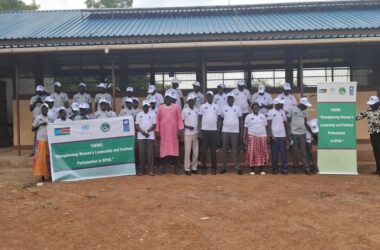By Gladys Fred Kole
South Sudan has received seven Hydrometeorological stations from Nile Basin Initiative as part of a regional Hydrological Monitoring System.
Hydromat systems are used to measure hydrological parameters such as precipitation, runoff, flow, water levels and speed.
Executive director of Nile Basin Initiative, Dr. Florence Grace Adongo officially handed over the high-tech system to South Sudan government.
The stations worth US$ 500,000 will provide real-time data and information, to enable informed decision-making processes.
The advanced system also empowers the government and relevant stakeholders to monitor and manage water resources effectively, ensuring sustainable development and optimal utilization of the Nile waters.
“This key milestone especially in this era of climate change as the real-time data capture and knowledge of the water resources will provide early warning, and guide national and basin-wide planning for sustainable development and management. As the adage goes, you can’t manage what you can’t measure,” Dr. Adongo said, after the handover.
According to the Nile Basin Initiative Executive Director, a design with a total of 150 stations was approved for optimal monitoring of the Nile basin surface water resources.
“With the support of the European Union and the Government of Germany, a total of 43 hydrometeorological stations have been rehabilitated in the basin,” she disclosed.
Seven of the stations are in South Sudan.
The stations, coupled with data management system installed at Data Management Center of Ministry of Water and Irrigation, will enable data collection and analysis.
The information generated, Dr. Adongo said will facilitate planning for the sustainable management and development of the Nile water resources.
The Nile Basin Initiative will continue to make efforts to mobilize resources to install more stations until we achieve the optimal number of 160 stations, she said.
To support these process, countries must honour their financial obligations to NBI through contributions to provide seed money for attracting external funding to implement various joint projects, Dr. Adong added.
According to her, through these Hydromet systems, if well sustained, the stations built will provide information that can be used to prepare proposals to support expansion, and resource mobilization for future investment.
For continuity in technical support to countries, the Nile Basin Initiative has put in place mechanisms for sustainability.
“These include the establishment of the help desk at the secretariat in Entebbe (Uganda), troubleshooting the system functionality and a hydrology expert working group from the member countries that are collectively and technically supporting the system,” she explained.
Meanwhile, South Sudan Minister of Water Resources and Irrigation, Pal Mai Deng affirms the Government’s commitment to cooperate with the NBI’s cause.
“As we are now moving to the stage of advancing economies, advancing technology, and advancing industrialization the water demand in the region will definitely increase not very far from now and this will actually be the reason for a tough competition over shared resources of the Nile,” the minister, said.
According to him, because of the cooperation among the Nile basin countries, it is not an option but a matter of necessity.
He stated that the country affirms its commitment to cooperation and to regional stability in peace of the region that might be affected if we don’t have cooperation at the centre.
“As we move into the future our demand for economic growth or construction of mega projects in the region will increase and if we don’t have cooperation at the heart then the years ahead will be of tensions among the countries of the Nile basin countries which we don’t want to happen. It’s time for the country to invest,” the minister urged.
However, Pal, thanked partners for contributing to this joint investment which is not only for the service delivery to the population in the Basin but also contributes to regional peace, security and stability.
With this understanding I do have a convention that it will be strategic myopia in our political short-sightedness to think of the lack of cooperation in the region it’s a must. He urged
For his part, the deputy head of mission at the German Embassy Bjorn Niere said that it is not only about cooperation, and development but also about environmental issues.
“Water consumption increases dramatically almost everywhere and climate will aggravate the problem, deepened cooperation around water is needed more than ever,” Bjorn
He said that the challenges in the Nile River basin are just enormous putting countries under pressure
“The Nile is of central importance to South Sudan’s development and the country plays an important role in the regional cooperation process and the management of the basin resources.”
He mentioned that efforts to level the playing field are still required and the capacity of South Sudan to manage the resources and make decisions and its development are critical.
“Germany is proud to support this important development,” he noted.



